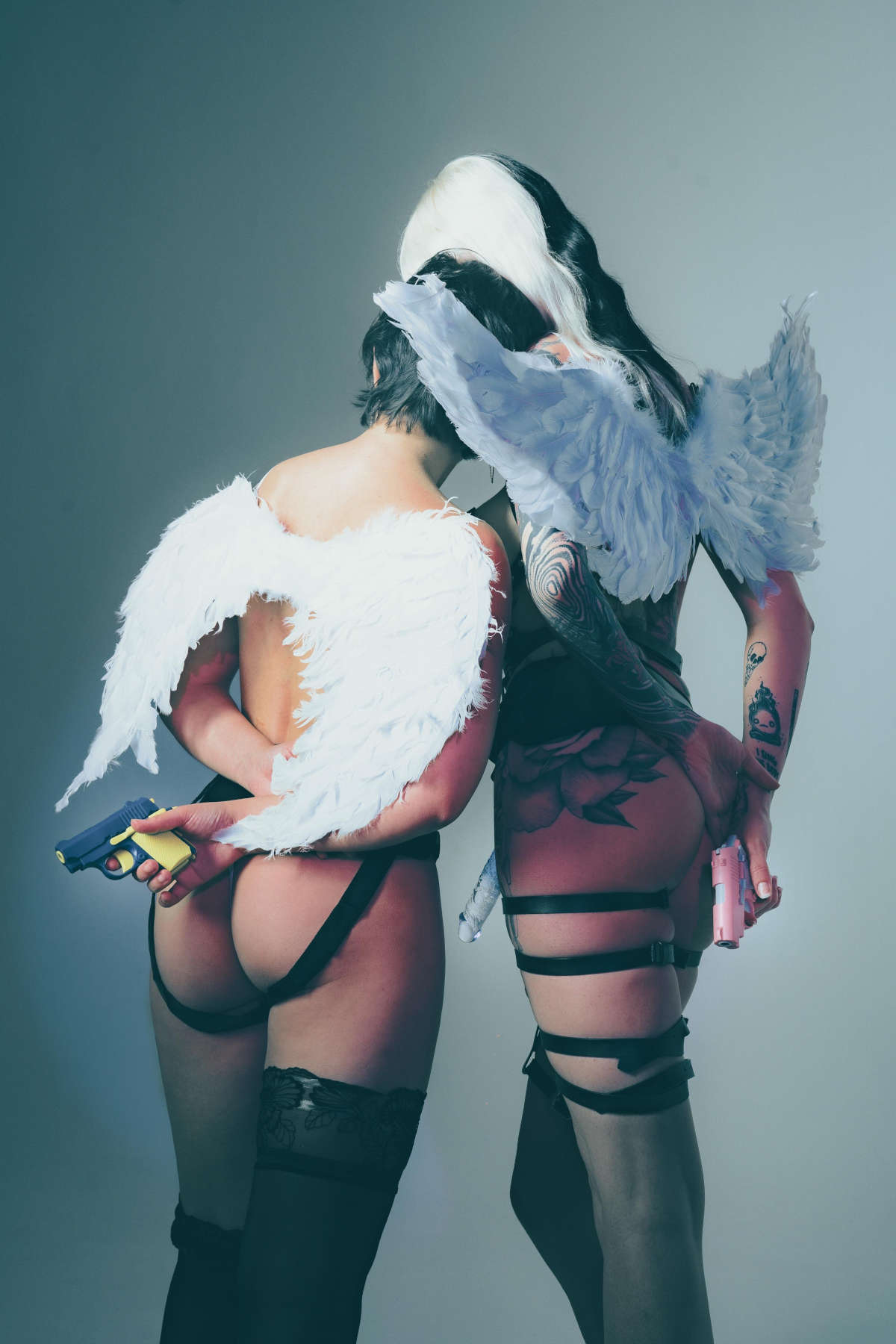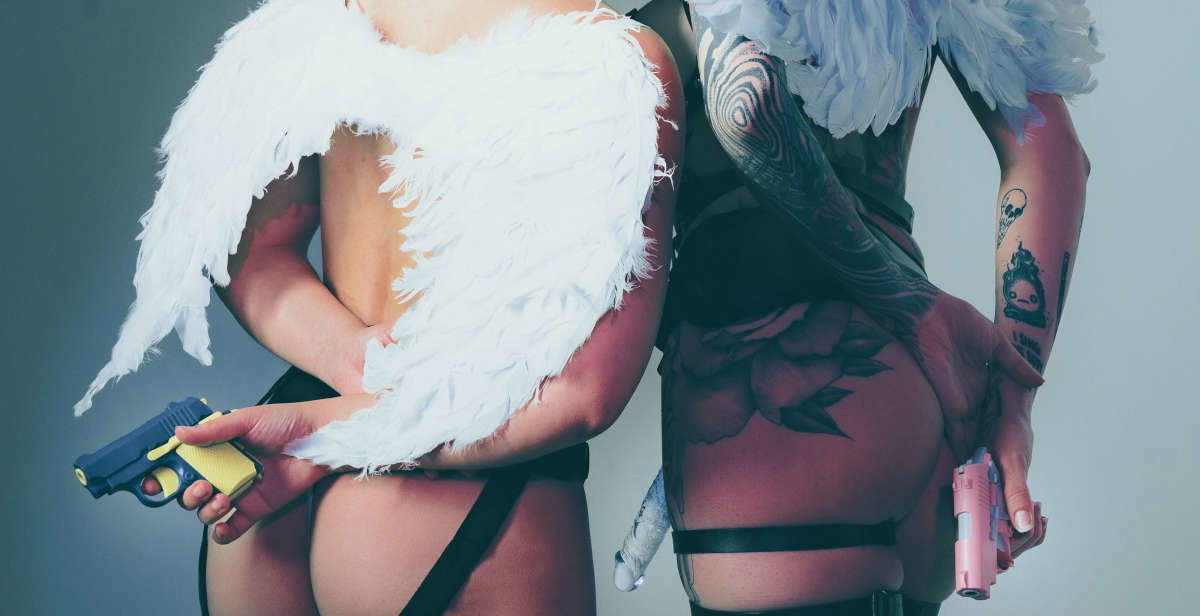Good Girls Get Banned is the provocative title of the exhibition that, from May 30 to June 22, 2025, transforms the bar.lina exhibition space at Viale dello Scalo San Lorenzo 49 in Rome into a critical laboratory on freedom of expression, the contradictions of digital platforms and the daily challenges faced by those working inadult entertainment. Curated by artists Olympia, Ardens and Agnese Zingaretti - brought together under the collective name @OnlyPoetryFans - the exhibition focuses on the emblematic case of OnlyFans, the famous platform created to give space to creators of explicit content and ended up in the spotlight for its restrictive and ambiguous policies.
The exhibition opened on Friday, May 30, at 6:30 p.m., with two performances scheduled on the opening night: at 9 p.m. and 10:30 p.m. Admission is for a symbolic contribution of 5 euros to support the OnlyPoetryFans project. But it is not only an artistic event: Good Girls Get Banned is also a visual, poetic and performative investigation of the new forms of censorship that hide behind the apparent openness of digital platforms. Those same platforms that should guarantee space, autonomy and income to those who produce independent content, and instead often end up limiting their activity in a discretionary and opaque way.
The very title of the exhibition recalls one of OnlyFans’ most controversial realities: the systematic blocking of accounts that do not comply with the platform’s criteria, which are often not clearly spelled out, and which particularly penalize those working in the sex-positive sector. The paradox is obvious: a site built on sexual freedom and body expression, which at the same time imposes stringent limits, affecting the very people who contribute most to its economic success.
Through visual works, texts, videos, and performances, the three artists unveil the inherent contradictions of these digital environments and offer an articulate reflection on the role OnlyFans-and more generally the digital spaces frequented by sex workers-plays in contemporary society. They talk about control, exploitation, and exclusion. But also about resistance, expression and art.
Olympia, a poet and performer, joins Ardens, a sex worker and activist, to give life to the intermediary project OnlyPoetryFans, which develops into a live performance but also finds continuation online, right on OnlyFans. The third look is that of Agnese Zingaretti (Aghnez Studio), a photographer and visual storyteller, who documents and narrates the process in an immersive way. Together, they construct a layered narrative: not only the performer’s experience, but also the behind-the-scenes, invisible work that accompanies the production of content, the discrimination faced, the strategies to evade censorship, and the attempts at self-determination in a space that proclaims itself open, but often represses.

The OnlyPoetryFans performance stages the life of a content creator, her daily dialogue with the platform and the pressures, fears, frustrations but also claims that run through her craft. It aims to be an intimate and political look at the same time. The audience is not a passive spectator: they are guided inside a path that leads them to question how the relationship between body, visibility, algorithm and market works. And finally, they have the opportunity to become an active part of the project, choosing to access - via subscription to OnlyFans - exclusive materials produced during the performance. This is hybrid content, somewhere between professional and amateur, which extends the sense of performance into the digital, challenging the barriers between stage and platform, between reality and representation.
The OnlyPoetryFans project is not only meant to be a critical reflection, but also an aesthetic and political proposal. It denounces a system that promises freedom and autonomy but reproduces, in new forms, mechanisms of control and marginalization. And at the same time it imagines an alternative use of digital spaces: not as gilded cages, but as tools for emancipation and sharing.
The exhibition is part of a larger context of debate about the role of digital technologies in people’s lives and work. The artists speak openly of “technofeudalism,” a term that describes the condition of dependence on platforms that exercise almost absolute power over their users, without offering real protections. The parallel is with medieval feudalism: just as serfs depended on lords for access to land, today creators depend on algorithms and policies imposed unilaterally by digital giants.
This is the political background of Good Girls Get Banned. The exhibition relies on art to communicate, to excite, to question. It moves between different languages - Olympia’s performance poetry, Ardens’ carnality and stage presence, Zingaretti’s visual intensity - and composes an experience that is both intellectual and sensory. In Rome, in the independent and transfeminist space of bar.lina, Good Girls Get Banned also wants to be an opportunity to revive a collective reflection on cultural, artistic and sexual work in the age when content travels on global platforms. Because, as the title suggests, to be banned are not only the “bad girls,” but all those voices that do not conform, that dare, that disturb. Those who use their bodies and their art to assert another narrative. And who for this reason, today more than ever, must be heard.
 |
| OnlyFans under indictment: exhibition in Rome exposes censorship and contradictions of the platform |
Warning: the translation into English of the original Italian article was created using automatic tools. We undertake to review all articles, but we do not guarantee the total absence of inaccuracies in the translation due to the program. You can find the original by clicking on the ITA button. If you find any mistake,please contact us.